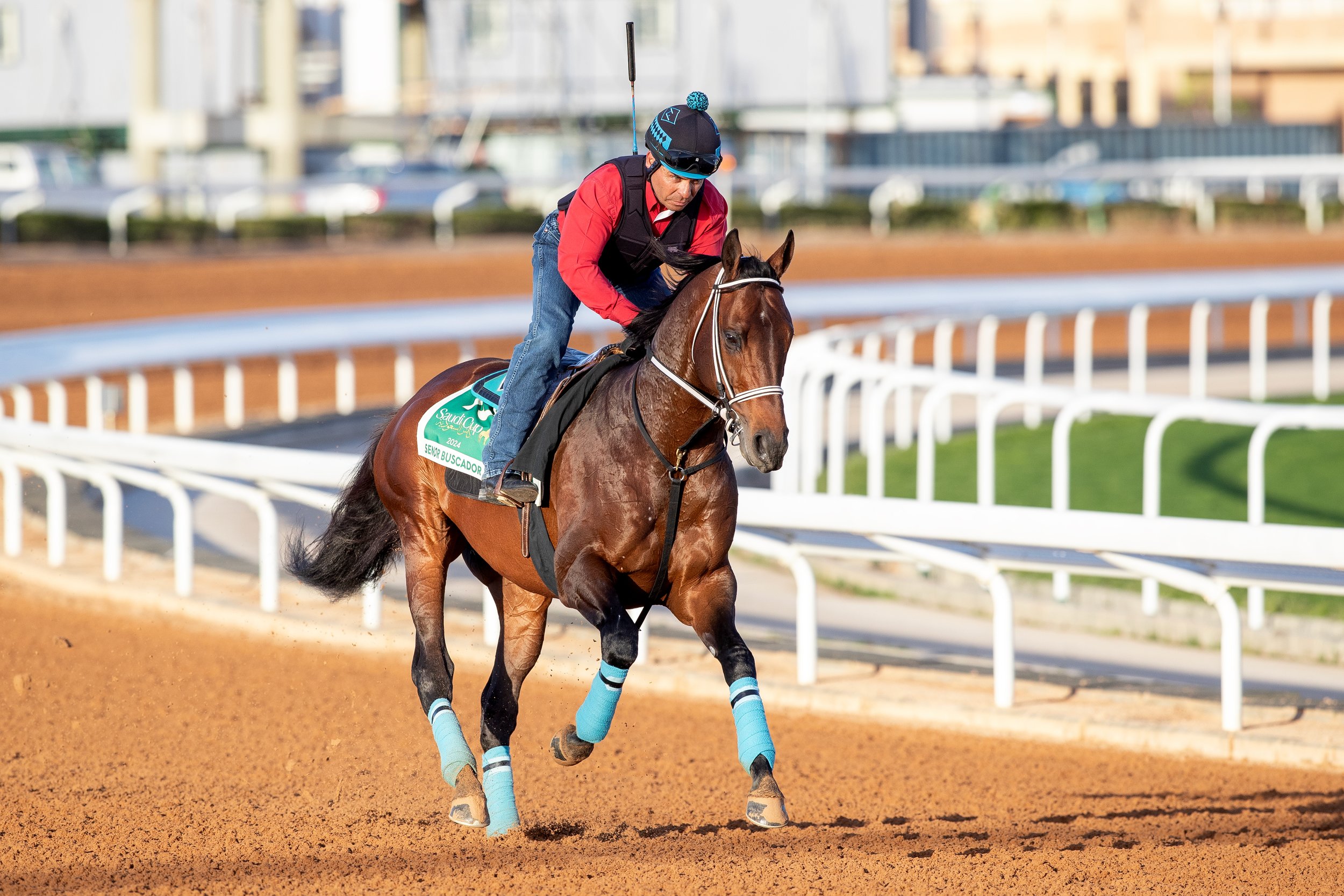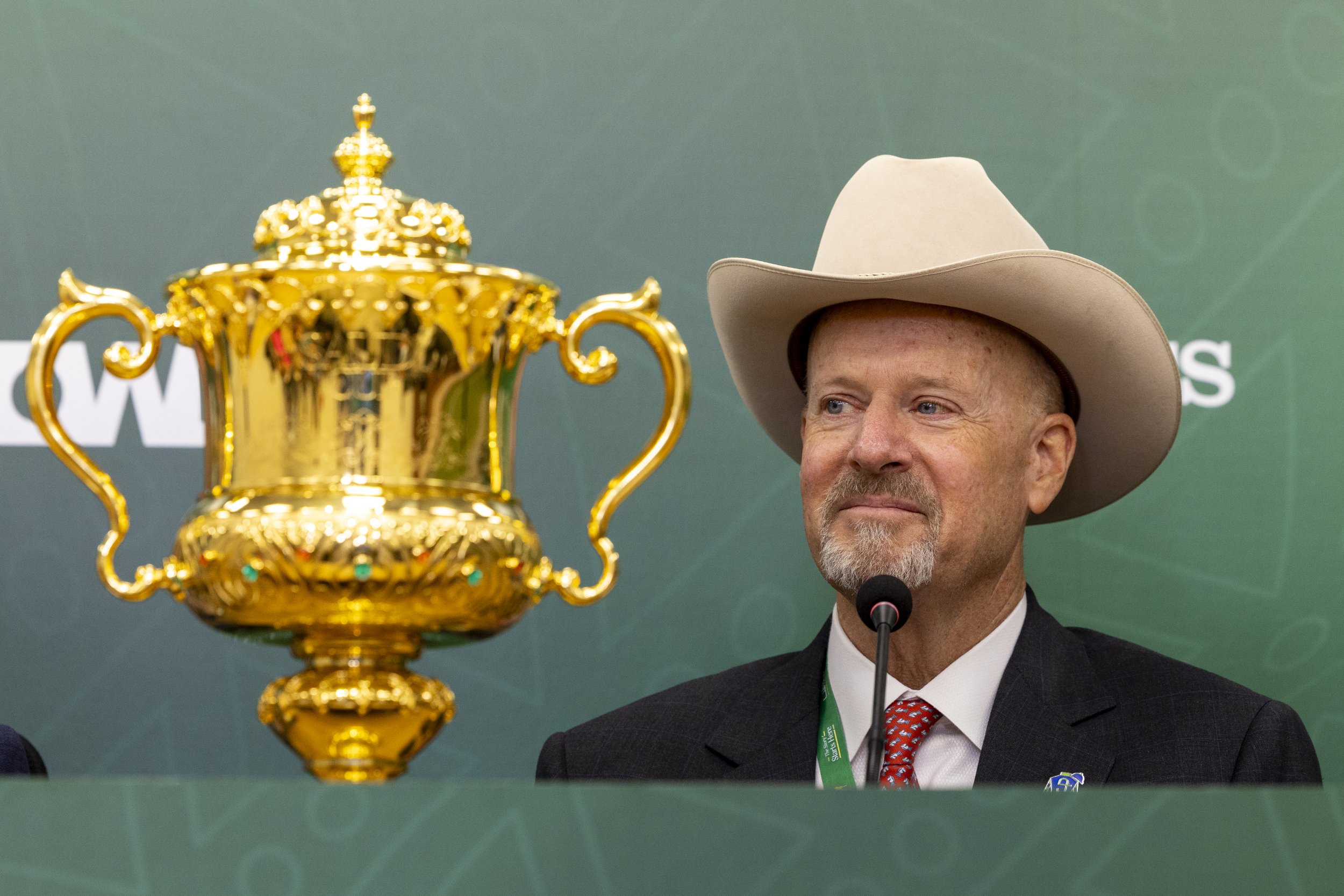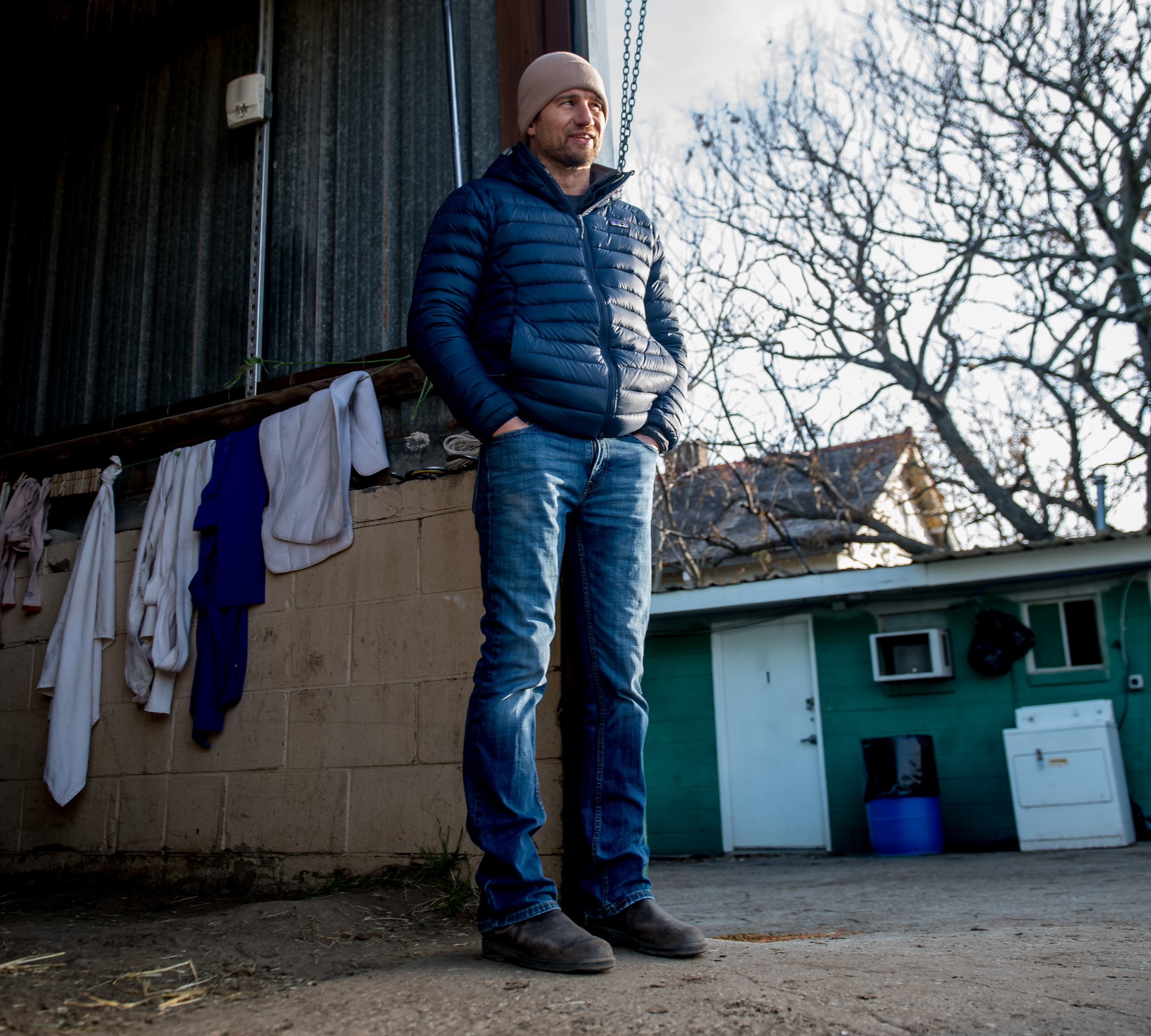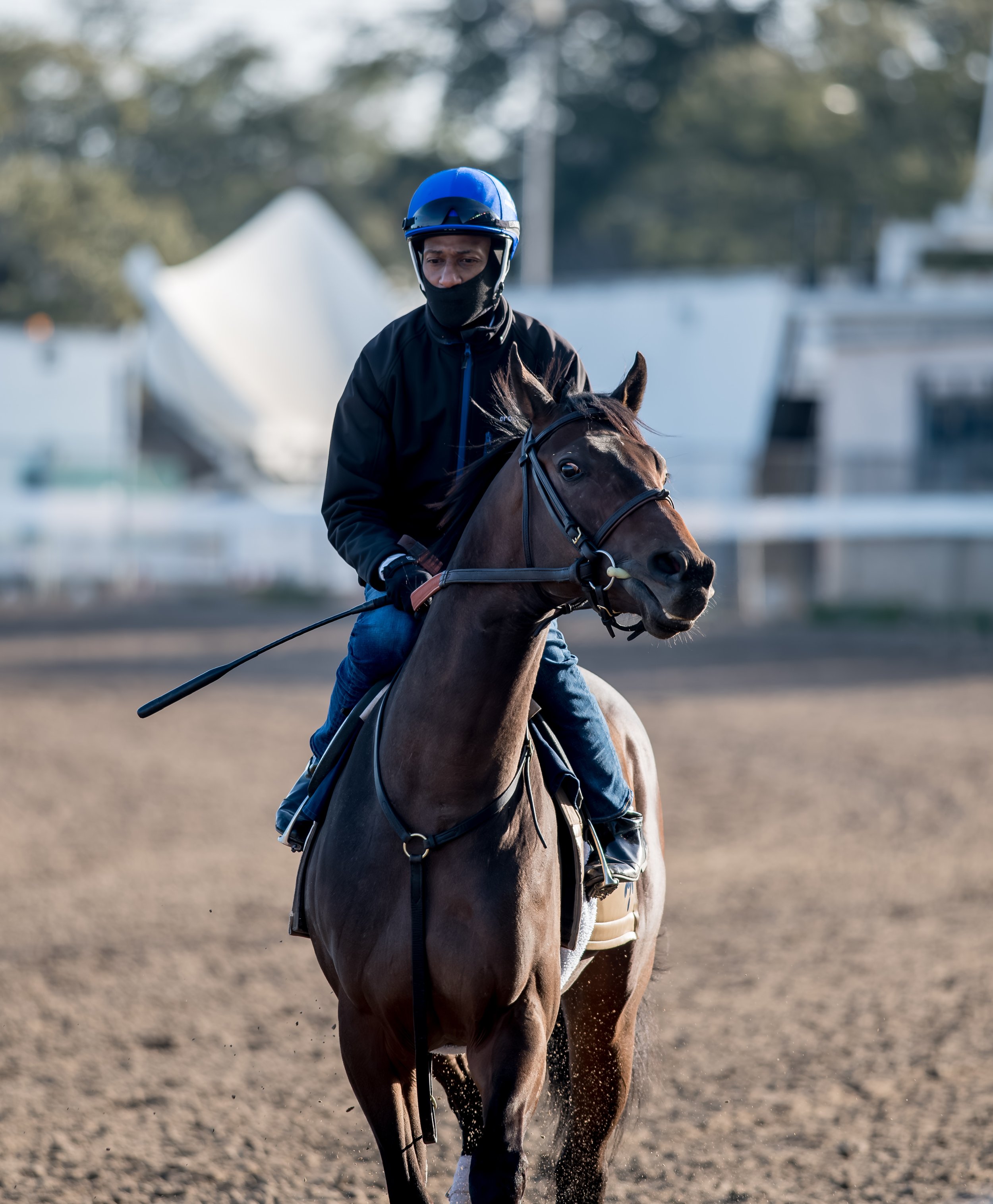Todd Fincher - From Sunland Park to Saudi Arabia
Article by Ken Snyder
Ask Todd Fincher how he got Senor Buscador from Remington Park to Riyadh and the $10 million dollar Saudi Cup winner’s purse, and you won’t get an answer; you’ll get a bunch of answers.
“There’s honesty. There’s hard work. Being able to evaluate horses and place them in the right spot. The feeding program. Your help. Not cutting corners. All that stuff.”
Got it, Todd. Now, what’s the formula for blending all of that? If it could be quantified and applied, we’d all be Thoroughbred trainers. Todd Fincher can’t tell you exactly how he arrived in the winner’s circle after the Saudi Cup. But there may be a reason why.
“You celebrate in the winner’s circle and then you walk out of there. You have your mind on other things, other responsibilities.”
At the post-race press conference, it was obvious he really had left any whooping, hollering, and hugging back in the winner’s circle. Maybe he smiled once as jockey Junior Alvarado and owner Jerry Peacock fielded questions. There’s pre-occupation and then there’s Todd Fincher pre-occupation. His mind was already on “other things,” specifically Sunland Park in New Mexico and his string of 90 horses.
He “came back immediately” from Saudi Arabia, which might have meant a red-eye flight that night. He came to Saudi Arabia as he departed, with no days or hours wasted with idle time.
“I didn’t go over until a couple of days before the race,” said Fincher. Instead, he sent assistant Oscar Rojero with Senor Buscador on the 13th of February for a race run on the 24th. Want to know about Saudi Arabia? Rojero, not Fincher, is your man.
An assessment of Fincher as a classic “big fish in a small pond” is subject to re-examination only partially because of the Saudi Cup win. Last year he shipped Senor Buscador to Del Mar to win the Grade 2 San Diego Handicap and finished second with two other horses--Flying Connection and Bye Bye Bobby in graded stakes at Del Mar. All total, his horses hit the board in graded stakes in four out of six races in San Diego. It’s not hard to imagine Fincher duplicating the success he has achieved in New Mexico in racing’s big ponds—Keeneland, Santa Anita, Saratoga, Belmont. Add to that an eye-popping 24% career win rate.
Looking back at Del Mar he understates his success considerably. “That’s starting to compete at the top level. Not Bob Baffert yet, but, you know, with the few numbers we have of those type of horses, I think we’ve done pretty well.”
Take note of that word “yet.” Fincher has thoughts of setting up a division at Del Mar in the future and is venturing into Oaklawn this year with “a few. But not a full string,” he added. Yet...
“Big farms aren’t going to look my way because I’m in New Mexico and I understand that, but I will eventually, maybe this year, start running two separate barns,” He added that he will "keep New Mexico going.”
Fincher is a defender of New Mexico racing and pointed out the state has produced both a Kentucky Derby winner in 2009 (Mine that Bird) and a Kentucky Oaks winner in 2011 (Plum Pretty).
“We got a lot of people in New Mexico who are great horsemen. You can develop a horse through our stakes schedule with good purses.”
If it’s a long way to Saudi Arabia from New Mexico, getting to Kentucky may be more manageable with more promising two-year-olds than ever in his barn.
“Last year when I broke babies, I had two Kentucky-breds. Two fillies and one colt.
“This year I had some people step up and fill my barn a little more. We broke fifteen yearlings this year that are Kentucky-breds or Louisiana-breds.
“It’s just very rare for me to get that many,” he added.
Roots in New Mexico run deep for the 52-year-old Fincher. His grandfather, Albert, was a trainer stabling at the old La Mesa Park in Raton, New Mexico as well as at Sunland. Albert’s son, Leroy—Todd’s father—also trained Quarterhorses and Thoroughbreds after a jockey career. As if that isn’t enough pedigree, Todd’s mom Leslie trained Quarterhorses and Thoroughbreds.
It is said that half of life is just showing up. Fincher has had only the other half to figure out. The major lesson he got from family was “Show up every day to work. That’s basically what I derived from my family.
“I worked in the barn. We had jobs at the barn. I would do the water buckets and he would do the hay bags. We were in charge of holding horses for the baths and raking the shedrow. I’m talking from an early age—probably nine, ten years old.”
New Mexico racetracks were also a playground for the Fincher boys. “Your parents would be working, and you’d be running around the grandstands walking back to the barn screwing around and just running loose basically.”
“Play” also included putting down a bet or two at the betting windows with mutuel clerks who knew the Fincher boys. “I could barely reach up to the window. I‘d put my two dollars up there and bet at an early age. That was illegal, but back then everything was a little quieter. “
Fincher’s dream was to follow in the family bootsteps and become a jockey. The lanky, six-feet tall averaged a respectable 14% win rate before waving the white flag to weight after ten years of riding in 1997 and immediately hung up his own shingle the next year. Fincher never worked as an assistant but started with eight horses, the most expensive of which was $5,000.
Transitioning from jockeying to training might have been the equivalent of a family doctor performing brain surgery. “The one thing that really shocked me about training is how much I didn’t know.
“You’ve heard jockeys don’t make good trainers. That’s basically because they’re two completely different jobs.
“There’s a lot of jockeys that don’t know horses. They just learned how to ride a horse and that’s all,” he added.
He believes his time on the ground grooming as an adolescent and teenager for his dad taught him the importance of understanding a horse. When it came time to sit astride one and break from the gate, that experience was invaluable…to a point.
“I could get on a horse and tell you everything about it…evaluate the horse.
“As a trainer watching, it was a brand new thing. It took a long time to be able to watch a horse and differentiate certain things about a horse—how good they looked when they were running, if they’re just average. Watching the horse move was the biggest challenge, I think.
“You learn from there, then the next year you get some more horses, and every year from then on. It’s grown, and we’re pointing for the quality and not the quantity. We kind of have both now.”
Fincher says 90% of his horses come to him as yearlings. “If I have somebody bugging me to claim horses, we will, but I really have no interest.
“You claim a horse, odds are you pay twenty-thousand dollars, and you got a twenty-thousand dollar horse.
“We’re looking for the home runs to develop a horse into a classic-type horse or stakes winner—the top level.”
Mission accomplished. They don’t get any more top level than Senor Buscador and the Saudi Cup and Fincher knew it.
He was confident the horse could beat the best in the world if he got an honest pace.
“As far back as he gets, he can get himself in a lot of trouble,” said Fincher. True to form, Buscador was far behind the field by as many as six lengths, loping along next to Japanese starter Ushba Tesoro. Entering the stretch, Senor Buscador fell in behind the Japanese entry then popped out from behind him to the outside. Again, true to form, he spotted Ushba Tesoro as much as three lengths in the stretch before cruising by ten horses, including his Japanese runner by a nose at the wire.
“I think he just lets them get after it first and enjoys running by horses. That’s exactly what it is. He’s got enough speed. He can go to the front if he wanted but he refuses.”
For Fincher, with his total focus, it’s not hard to believe that “validation and vindication” for Senor Buscador meant more than the purse. “Everybody talks about the purse, which is outstanding. For him to beat the best horses in the world was much, much greater for me than the value of the race.
“I’ve been making excuses for this guy for a long time knowing how good he is.”
Adapting to the horse rather than the other way around might have been still another additional factor in the win. “If I really tried, I guess I could probably change his running style, but I think it would be detrimental to him.
“The ability is there, and I think he’s the best horse. I don’t question that.”
Fincher’s abilities as a trainer sort of mirror Senor Buscador’s performance in the Saudi Cup. All the horse needed was a clean trip. All that Fincher needs is the opportunities. Racing has probably not seen the last of him at center stage like the winner’s circle at King Abdulaziz Racecourse, but you’ll have to hurry to catch him before he’s gone.
Other things. Other responsibilities.
Todd Fincher would amend lyrics to an old song from the 1950’s movie Cinderella "A Dream Is a Wish Your Heart Makes" to “A Dream is a Wish your Hands and Feet Make.”
The dots don’t connect between Sunland Park and Ruidoso Downs in New Mexico and King Abdulaziz Racecourse in Saudi Arabia and Meydan Racecourse in Dubai…unless you’re Todd Fincher.
A win in the $20 million Saudi Cup with Senor Buscador and a third place showing in the Dubai World Cup (earning a mere $1.2 million) are dreams most trainers wouldn’t ever entertain.
For those who know him any length of time, it is no surprise to hear him say on reaching the highest of heights in racing, “I’ve always been planning on it and hoped to get there. Those are goals that I set. I hope we can reach some more goals pretty soon.”
Gulp.
At first you might not take him seriously until you consider that, well, he did it once, and yes, he did it based in Sunland Park, New Mexico.
Asked what he did after Saudi Arabia and Dubai, the laconic cowboy simply said, “Came home and went back to work. That’s what we do. Go to work every day.”
And make dreams come true.
Whit Beckman trainer of Belmont Stakes contender - Honor Marie
Article by Bill Heller
Trainer D. Whitworth Beckman grew up around horses but had never made the connection his parents did. His father, David, is a vet. His mother, Diane, rides and shows horses. “I was around them, but I wasn’t really interested, horses weren’t even on my radar.”
He spent two semesters at the College of Charleston. “I partied a lot,” he said. “I didn’t have any purpose. I was aimlessly floating around on alcohol. After two semesters, I figured I was wasting my time and wasting my parents’ money.”
His life got worse after dropping out from college. “I got pretty heavily involved with drinking. I hung out with a crew. A little wild. There was nothing that gave me purpose. I was a selfish kid.”
Eventually, he began helping his mom take care of polo horses and old show horses. And then he met his mom’s most difficult horse, a cantankerous Thoroughbred named Black Pearl. “I still have him,” his mother said. “We call him Blackie. He was a kook. He couldn’t be trained. He took off with his rider every morning, constantly switching leads. Whit taught himself how to ride on that horse.”
She still can’t believe it.
Beckman had found his purpose. “What I found with this horse was a new connection,“ he said. “He taught me a lot. You can lie and cheat with people. With a horse, it’s 100 percent honest. They do all the crap we ask them to do. They don’t lie or cheat. I think that’s refreshing. We should learn from them.”
He still is, and he doesn’t preclude learning from people, too. He worked for Todd Pletcher, Eion Harty and Chad Brown. Sandwiched in between, he trained in Saudi Arabia.
In 2023, only Beckman’s second full year on his own in the United States, he posted 13 victories, 13 seconds and four thirds in 102 starts with $1,468,695 in earnings, more than double what he earned the previous year. He recorded his first stakes victory and, soon afterwards, his first graded stakes. His stable grew from one horse to 26.
He had help, especially from his best friend Kristian Villante, a bloodstock agent who trades under the name of Legion Bloodstock. They became friends when they both worked for Todd Pletcher. “We have very similar personalities,” Villante said. “We became friends and it kind of grew.”
Villante helped Beckman grow his stable. “We said we’d give him the push,” Villante said. “You can open the door for someone, but then, it’s up to him what to do with it. You can provide the opportunity. A lot of credit to Whit.”
It’s been a journey. His mother said, “He doesn’t give up and he always shows up.”
“He didn’t get lucky,” Harty said. “He conducts himself in an exemplary fashion. He’s a good communicator. He’s a very good person. He inherited it from his family. I got to meet them a couple times. You can tell where he got it from.”
But his family didn’t see it coming.
“If you would have told me when he was in high school that he’d get up at 4:30 in the morning to take care of horses, I’d say you’re crazy,” recounted his father, David. “He’d go to a variety of farms with me and he didn’t seem to like it at all.”
His parents sure did. David and Diane Beckman met in a barn. “I was just out of college and I ran a barn in Goshen,” Diane said. “David came to the barn one day. He’s like Whit, very quiet. I thought he was very good-looking.”
David, who had just graduated from veterinary school in 1979, asked her to a University of Kentucky football game. They both went there.
Diane was smitten: “After a couple of months I said, `I want to marry him.’ His character … we’ve been married 42 years and I’ve never known anyone I respect more. He’s been a great father. He works every day. He’s kind. He was on call 24/7.”
The Beckman’s have four children. Whit is the oldest. “When the two boys would get in trouble and David wasn’t there, I’d say, `You’re going to go with your dad and work on weekends.’ I think that’s what turned Whit off on horses – for a while.”
Beckman explained, “She’d say you’re going to work with him. I associated being bad with horses.”
Whit seemed isolated growing up. “He struggled,” his mother said. “He was so shy. He was a kid who lived in his imagination. We sent him to college when he wasn’t ready for it. The College of Charleston put him in a hotel because the dorms were full. It wasn’t a good fit. He came home, and at that point he was really lost. He didn’t have the straight path in life. He met his struggles and has worked through them. Whit was a late bloomer.
“I have always been proud of the person Whit is. He’s trustworthy, and he’s always going to do the right thing, like his father. He’s never going to say anything unless he means it. He’s going to be honest. I’ve always been proud of him because he had the roughest road. He willed himself to where he is today.”
It took a decade and a half and many, many miles. After working with his mother’s horses, Beckman began working with Walter Binder at Churchill Downs and Louisiana Downs. Beckman returned to Kentucky in March, 2006, and his father helped him get a job with Alex Rankin at Up and Down Farm. “It was a great place to learn,” Beckman said. “It gave me a lot of experience. I developed horsemanship.”
He continued to develop that working with Dave Scanlon and Danny Montada getting Darley two-year-olds ready for sale at Keeneland.
Beckman was fortunate to meet trainer Eoin Harty, who reached out to Todd Pletcher for him. Later, Harty would hire Beckman to be his assistant.
Beckman began working for Pletcher at the 2007 Saratoga meeting. “Towards the end of the meet,” Beckman said. “You go to Kentucky. You see the routine. At that time, I could just wake up every morning and say, `How cool is this? I’m working for the top trainer in the country.’”
Pletcher was glad to have him: “He was always a very top-level assistant. Good horseman. Good demeanor around the barn. I’m not surprised to see him doing well.”
After working for Pletcher, Beckman journeyed to Saudi Arabia, an experience with mixed blessings. “At that point, I had just turned 30,” Beckman said. “It was an opportunity to go on my own. I thought it would be a cool thing to go to the Middle East. A rich tradition of horses. We won some races, but it was an extremely different environment. They bring you over, but they don’t listen. They say, `God’s will.’ Religion and their faith take precedence. It was sticky.”
In 2014, Beckman learned his girlfriend was pregnant. He returned to the U.S. and took a job with Harty. “He was already a qualified trainer by the time he got to me,” Harty said. “He was looking for a job and I was looking for an assistant. It worked out immediately. I showed him the way I like things to be done. He was a huge asset. He deserves nothing but the best.”
With a daughter on the way, Beckman returned to Saudi Arabia. He then returned to America to be there for her daughter Violette’s birth on December 23rd, 2015, three days after his 34th birthday. “When she was born, it was the best thing in my life,” he said.
Yet he was ready to return to Saudi Arabia a few days later. “I got to the jetway,” Beckman said. “I was standing there. I couldn’t do it. I was thinking of myself. I wanted to be home with my daughter. I turned around. I felt great about it.”
He felt even better when Charlie Boden, then with Darley, told him Chad Brown was looking for an assistant, as if Beckman was being rewarded for staying with his daughter.
Beckman began working with Brown on April 4th, 2016, and stayed until the summer of 2021 when he ventured on his own with the full support of his sister, Lindley Turner, who had been doing their fathers’ bookkeeping since 2008. Now she does both. “When Whit decided to train on his own, I offered to handle all the financial and the bookwork,” she said. “Not fun stuff, but necessary to keep the business going. Whit was away for 20 years. I wanted to see what he spent 20 years doing. It’s really cool to watch.”
She really liked what she saw from her brother: “He did all aspects of the job. He put a lot of time in everywhere. He had a very clear vision of what he wanted his stable to look like. As a money person, I said, `I believe in your vision.’ We put in basically everything a top barn would. He knew how he wanted to take care of his horses. How his shed row would look. He did the digging. He raked it out himself. From the very start, he put in the system he knew. He told me if you do this now, it will pay off. He was exactly right. It’s come to life, even though we started with one horse.”
She vividly remembers when that first horse, Truly Mischief, an unraced two-year-old owned and bred by Newtown Anner Stud, arrived, September 11th, 2021: “I remember the horse coming to me, and feeling bad for him because he was the only horse in the barn. I said, `We’re going to get you some buddies.’ It was really exciting, just watching Whit train his own horse. He’s very hands-on. It’s not a number thing with him. It’s about the individual.”
It always will be. “There are 20,000 Thoroughbreds bred every year,” Beckman said. “We have to do everything we can to make them reach their potential, no matter what level they’re at. Keep them happy; keep them healthy, get them fit to run. It’s funny, you constantly learn things. You show up every day. Get there early. Make the adjustments that have to happen for the individual. You’ve got to be passionate about it.”
His buddy Kristian Villante knew that he was: “I think he genuinely has a passion for it. It’s more than just a job. It’s a craft. There’s an art form that goes into racing. It’s not just the x’s and the o’s. There’s not really a playbook. What makes great trainers great trainers is they can make adjustments.”
Truly Mischief needed them. He was sixth in his debut, December 1st, 2021, then raced five more times before finally breaking his maiden at Horseshoe Indianapolis on September 28th, 2022, a year and 17 days after he arrived at Beckman’s barn. On February 26th, 2023, at Tampa Bay Downs, Truly Mischief finished fourth and was claimed for $25,000.
Beckman’s neighbor and friend at St. Xavier High School in Louisville, Chip Montgomery, sent Beckman his second horse, a two-year-old filly named Think Twice. She didn’t do much, finishing fifth in her debut, then seventh when claimed for $30,000.
Legion Racing’s four-year-old filly Sabalenka, Graham Grace Stable’s five-year-old gelding Harlan Estate and Ribble Farms’ three-year-old colt Honor Marie have been Beckman’s first three stars.
Sabalenka has two wins, two seconds and two thirds from nine starts with earnings of $427,498. She finished third in the 2023 Christiana Stakes at Delaware Park, July 15th, and second in the Dueling Grounds Oaks at Kentucky Downs, September 3rd. She is the most talented horse Valante helped him land. “They always had my back,” Beckman said. “She was the first one, as far as a nice horse, that gave me a little exposure. She was just a nice filly.”
In between those stakes placings, Harlan Estate, sent off at 37-1 in the $500,000 Tapit Stakes at Kentucky Downs, delivered Beckman’s first stakes victory – after surviving an inquiry. Far back in the field of 11 early, Harlan Estate won by a length and three-quarters under Declan Cannon. “The horse came from Canada, Beckman said. “We were looking for a turf horse who could compete in open company. She filled all the criteria. Everything blossomed. I knew we were on the right track. It was an awesome day.”
Also rallying from last in the field of eight, Honor Marie captured the $400,000 Grade 2 Kentucky Jockey Club Stakes by two lengths under Rafael Bejarano, earning 10 qualifying points for the 2024 Kentucky Derby. Honor Marie, a $40,000 purchase at the 2022 Keeneland September Yearling Sale, has two wins and a second in three career starts. “From the time he came in, he was a quality horse,” Beckman said. “He needed to mature on a physical level, but I knew I had a good horse in my hands. We knew two turns would help him. I wasn’t surprised, but it was awesome. We got to see what he did in the morning, materialize in the afternoon.”
Of course, he’s on the Kentucky Derby trail. His next start will be in the Grade 2 Risen Star Stakes at The Fair Grounds.
Beckman’s stable has grown to 26. His momentum is considerable. “I’m really proud of him,” Beckman’s father said. “He is my oldest child of four. He got a little lost. He’s overcome a lot. Horses saved his life.”
Villante’s father, Joe, who sells trainer products, is a big fan of Whit: “Whit is fantastic. He’s really good at communication and he doesn’t think he’s splitting the atom or inventing the game. I really appreciate that.”
He shared this: “About a year ago, we were at Tampa Bay and training horses were coming off the track. Whit had a low-level horse. He asked the rider what he saw the whole way back to the barn. He wrote all these notes. That’s attention to detail. It’s a moment that stuck in my head. I have friends for 20, 25 years. They don’t ask questions. They think they know everything. I was very impressed. This kid is going places.”
He already has. And he’s only just begun.

















